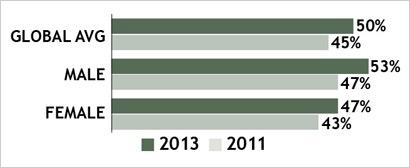research
Nielsen: Consumers Who Care Are On The Rise
- by Laurie Petersen , August 8, 2013

Giving back to
society grows in importance as a global business strategy and consumers of all ages care about it more than they did just two years ago.
That is the finding of the latest report from Nielsen Holdings N.V. on “The Global, Socially-Conscious Consumer.” (Download full report here.) When Nielsen first undertook the research in 2011, 45% of respondents agreed they are willing to pay more for goods and services from socially responsible companies.
This year, the percentage jumped to 50%. The most dramatic increase was seen among 40 to 44 year olds, who went from 38% in 2011 to 50% in 2013. Those in the 50-to-54-year-old bracket are also catching up to their younger peers, with 48% now saying they’d pay more vs. 37% in 2011.
advertisement
advertisement
“Today, the question is not whether consumers care about social impact, but which ones, how much and how to appeal to them,” said Nic Covey, vice president of corporate social responsibility at Nielsen. “The answer isn’t necessarily a traditional cause-marketing campaign – general responsibility, sustainable innovation and purpose messaging might also engage these consumers. No matter the approach, savvy brands are figuring out how to hit this nerve.”
Not all countries care the same way, however.
India was in the lead, with a 75% agreement, up nearly 20% from 56% in 2011. Other Asian countries followed suit. The United States came in at a 44% caring sentiment, up from 36% in 2011. On average, just 36% of people in European countries would pay more for goods from socially responsible companies. Ranking dead last were Russia (29%), Belgium (28%) and Estonia (27%).
“In countries where skepticism toward corporate social responsibility runs high, cause-marketers face an uphill battle,” Covey said.
Still, a gap exists between those are willing to spend more and those who actually do, Nielsen researchers found. About 4 in 10 global respondents (43%), say they have actually spent more, and the disparity between that and 50% saying they want to could be caused by the lack of clarity at point of purchase about a company’s actual stand in the marketplace.
This creates an opportunity.
Countries Nielsen identified as “uniquely ripe” for cause-marketing programs include Slovakia, where there is a 28-point gap between those who say they would spend more and those who actually have done so. Similar spreads exist in Bulgaria, Peru and Hong Kong.
The survey of 29,000 online consumers in 58 countries did not ask consumers to rate any specific brands.


